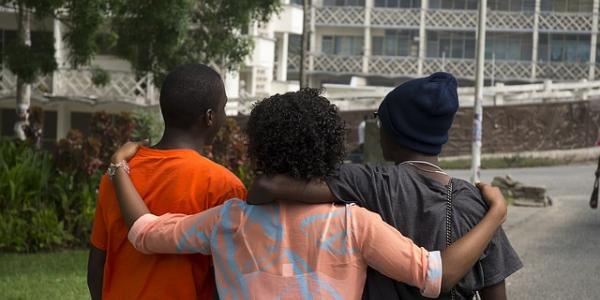The Seven Tasks of Adolescence: Task 2 - Joining a New Tribe

As teens begin to loosen their ties to their family, they begin the sometimes stressful process of figuring out who their people are.
In her book Untangled: Guiding Teenage Girls through the Seven Transitions Into Adulthood, psychologist Lisa Damour has identified seven tasks that adolescents are all trying to work through in order to reach adulthood. She says that adolescence is a period characterized by rapid and uneven development. When one or more of these tasks get interrupted, it may suggest that this is a child who needs a little more attention, and could possibly use some formal intervention. Understanding these seven tasks can help parents know what kids are going through, to know when kids are being normal and need our support as they do their job of becoming an adult, and to know when it really is time to worry.
For the next few months, I will be writing about each one of these tasks, exploring what a child looks like as they are moving through the tasks; why the task is so important; what kinds of behaviors might suggest that a child is really struggling with a task; and what a parent might need to do about it.
TASK 2: Joining a New Tribe
Last month, we saw how and why teens begin to move away from a child’s relationship to the world around them, and toward a more adult oriented approach where they have more independence, authority, and responsibility. With that movement toward being an adult comes the loosening of their ties to their family, and a strengthening of ties to their peers. And suddenly, it becomes important for a teen to find their own people. They need to feel like they belong to a tribe.
The process of finding out who their people are will require your teen to start to answer some fairly complicated questions about relationships and identity, whether they’re aware of this process or not. They have to figure out if they like their friends, or if their friends like them. They may wonder if the group of kids they are hanging around with represents who they are, or what they’d like to become. They may worry about belonging to the wrong tribe, and what the costs of being in the wrong tribe might be. Or, if they should try to join more than one tribe, or if they should find a better tribe. Or, what they might do about tribe members they don’t like.
These questions can be very stressful for teens to try to sort out, made more difficult because most teens feel a great deal of pressure to get these questions right. Teens may be more willing to take risks or to suddenly begin to act negatively or aggressively toward others in order to gain or maintain status in a group. Younger teens in middle school are especially vulnerable to this as they try to become part of a group, and often will be mean, or overlook other kids in their group who are mean or aggressive toward others, so as to not jeopardize their position in the group.
Of course, there’s the issue of popularity, which is a kind of measure that kids (and often parents) will often use to gauge their success in finding the “right” group. The concept of popularity is a bit sticky, as many will see popularity as being about which kids in school are liked the most, and sometimes this is true. But, kids who are popular are often those who hold a great deal of social power. That social power may be gained by kids being well liked by everyone, and often these kids use their power by finding the balance between being friendly and assertive. But, others gain their social power through the use of cruelty, shaming, and exclusion, which allows these kids to maintain their power because others are afraid of the consequences of crossing them. At times, kids in these groups have very harsh methods of punishing disloyalty, discouraging members and other peers from challenging them or standing up for themselves or what they think is right. Teens who are hoping to gain access to one of these groups sometimes confuse popular with power, and may be drawn into engaging in behaviors to gain power, but may also make them disliked and feared by many classmates at the same time.
What Parents Can Do
A parent can have an important role with their teen as they try to sort out what kind of social person they want to be. The process is a very stressful one, and one that feels very important to get right. As parents, we may judge our kid’s anxiety about their social life, thinking that “there are more important things to worry about right now”, or “these friends you’re so worried about won’t matter in ten years anyway!” But to them, this is a big deal, and to dismiss it potentially removes you from being an active helper in this struggle.
So, here are a few ways you can help your child navigate this task:
- Be mindful of your own assumptions about popularity. We know that the happiest teens are the ones with strong and supportive friendships, not necessarily the kids with the most friends. But it’s also easy for parents to get worried about their kids if they only have a few friends, or if they aren’t busy every weekend. Check with your child and see if they are content with the number of friends that they have. If they have a few very strong and connected relationships, that’s great, even if they’re staying home on a Saturday night.
- Talk to your child directly about popularity. If your child talks frequently about kids that are more popular than they are, try not to lecture them about how ridiculous their worries are. Instead, encourage them to wonder about what makes those kids popular. Ask questions like, “Is she popular, or is she powerful?” “Do kids like him, or are the scared of him?” This helps to take popularity down off of its pedestal.
- When talking about other kids, talk about their behavior rather than who they are as a person. Talking about a child’s behavior allows you to have a honest conversation with your child about the choices that people make without creating the sense that they are being disloyal. It also helps model non-judgmental empathy for others, where we can be aware that someone’s choices may be problematic while not judging them as a person.
- Encourage your teen to directly address conflict with friends (when this is safe). Conflict is stressful and easy to avoid, but it also challenges new learning, self exploration, and skill building. Helping your teen learn how to be honest with their friends about concerns that they may have helps them learn how to be aware of their own feelings and thoughts, and how to express these thoughts and feelings in ways that help resolve conflict.
- Let your kid use you as the bad guy to escape complicated social situations. Teens are more likely to take more risks when they are with their friends, and often they may engage in behaviors that they are very uncomfortable with but feel the need to “go along” to avoid social shaming. Allowing them to blame you, by saying something like “Oh, my ridiculous mom will KILL me if I do that,” or “Geez, I just got a text and my dad is soooo annoying; he wants me home for some reason,” they can protect some of their pride and still decrease risky behavior.
- Make an agreement that you will come to get them anytime with no questions asked (at least until later). Your teen may be embarrassed to call a parent if they have found themselves in a scary or problematic situation. And, they certainly won’t call you if they think that as soon as you pick them up, they’ll get the lecture of all lectures. Let them know that you will prioritize their safety and willingness to make good choices over a lecture, and that you’ll pick them up anywhere, and that you can talk about things later if you need to.
- Talk with your teen about what to do if a friend is being unsafe. Many teens have already developed a beautiful capacity for empathy, and sometimes they may find themselves in a relationship with a peer who is experiencing substance use disorder, cutting, talking about suicide, dealing with eating disorders, or has parents who are abusive. Teens will not know how to be helpful to these kids, but if they have never been told what to do, they will often try to help the friend themselves, which could be problematic for both. Let your teen know that the best, most loving thing that they can do for these friends is to learn how to connect them with adults, whether that be a teacher, a principal, a school counselor, or even you. Acknowledge that they may feel like they are betraying their friend by involving an adult, and that this is a normal feeling; but that what they are doing is the right thing and the loving thing.
When To Worry
While we may worry about many aspects of our teen’s social life, there are three major concerns that could indicate the need for more intensive intervention:
- A child who is completely socially isolated. Again, many teens have only a few friends, and some may only have one friend, and this may be completely normal and just fine, especially if they are generally doing well otherwise. The concern here is for a teen who has literally no friends at all, no social contacts, seems to avoid social interactions, and may appear worried or angry when social opportunities arise. This would include a high school student who exclusively hangs out with only their parents, as this may indicate some social avoidance. There may be a number of reasons that a child isolates, and some of them may be even self protective, but it is an indication that something may be going on to interrupt the developmental need to find their people.
- A child who is being bullied. Bullying is serious, and it has potentially dangerous consequences if ignored. If you become aware that your child is being bullied, let them know that it is never acceptable to be bullied, harassed, or terrorized, and that you will be there to help them. They need to hear that, because children who are bullied may feel very alone, and may have rationalized the bullying to make it feel acceptable to themselves. Then, explore with your child what they need, and then get them the help that they need.
- A child who is bullying others. If you find out that your child is a bully, deal with it immediately. A normal parenting impulse may be to assume that there is no problem, that your child is only engaging in a little teasing, or that it’s natural for kids to fight with one another. But, what may seem normal to you may have serious consequences for someone else. Find out what happened from multiple perspectives, and not just your child’s point of view, and try to not be judgmental about the views of others, because there may be other “truths” that would be important to understand. Involve the school. Encourage empathy for the victim, and talk about the importance of accepting responsibility for your own actions. Find a therapist in your community who works with bullies.
If you are concerned about your teen and would like to have a conversation with someone to sort out whether or not your teen is engaging in behaviors that you need to worry about, feel free to contact MSU’s Employee Assistance Program. You can set up an appointment to talk with a licensed counselor about your concerns, who will be able to help you sort out your concerns, and explore any options you have to get your child the help that they need. Contact MSU’s EAPat
Next month: TASK 3 -- Harnessing Emotions!
Related Articles

Now is the Time for Increasing Our Psychological Flexibility
In a strange and confusing time, these strategies and resources can help you be in the present, open up, and do what matters.

Take Care of Yourself on National _________ Day!
National holidays give you a great excuse for some fun self care.


Parenting Self-Help Books That Might Actually Help!
With so many parenting self-help books to choose from, it's sometimes hard to know which ones will actually help! One of our Emotional Wellness consultants provides you with a list that he recommends to his clients to get you started.





